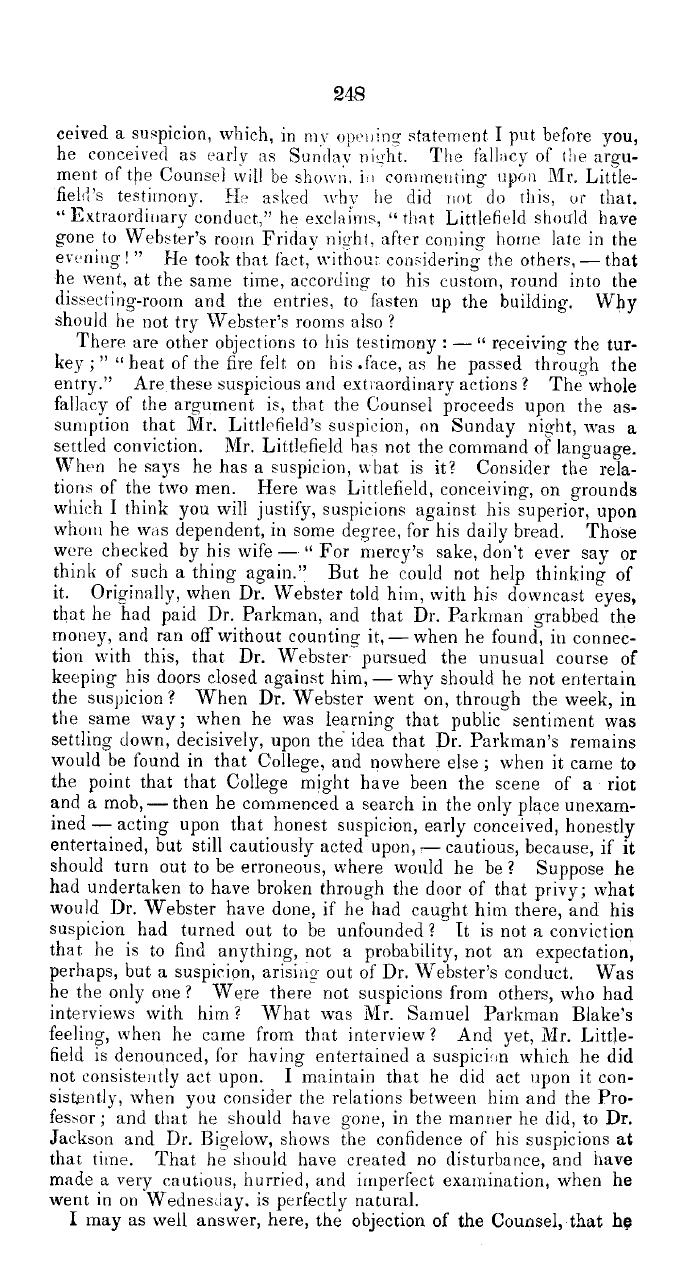|
2413
ceived a suspicion, which, in me opei)inff statement I put before you,
he conceived as early as Sunday ni,,,ht. The fall,icy of the argu-
ment of the Counsel will be shown. i'i commenting upon Mr. Little-
fiekl's testimony. fl:, asked why lie did not do this, or that.
"Extraordiuary conduct," lie exclaims, "that Littlefield should have
gone to Webster's room Friday niLht, after coming home late in the
ev=,niug!" He took that fact, withou; considering the others,-that
he went, at the same time, according to his custom, round into the
dissecting-room and the entries, to fasten up the building. Why
should he not try Webster's rooms also ?
There are other objections to his testimony : - °~ receiving the tur-
key ; " '° heat of the fire felt on his .face, as he passed throu;rh the
entry." Are these suspicious arid extraordinary actions ? The whole
fallacy of the argument is, that the Counsel proceeds upon the as-
suncption that Mr. Littlefield's suspicion, on Sunday night, was a
settled conviction. Mr. Littlefield has not the command of language.
When he says he has a suspicion, what is it? Consider the rela-
tions of the two men. Here was Littlefield, conceiving, on grounds
which I think you will justify, suspicions against his superior, upon
whom he w~,s dependent, in some degree, for his daily bread. Those
were checked by his wife - " For mercy's sake, don't ever say or
think of such a thing again." But he could not help thinking of
it. Orivinally, when Dr. Webster told him, with his downcast eyes,
that he had paid Dr. Parkman, and that Dr. Parkman grabbed the
money, and ran off without counting it,-when he found, in connec-
tion with this, that Dr. Webster pursued the unusual course of
keeping his doors closed against him,-why should he not entertain
the suspicion? When Dr. Webster went on, through the week, in
the same way; when he was learning that public sentiment was
settling down, decisively, upon the idea that Dr. Parkman's remains
would be found in that College, and nowhere else ; when it came to
the point that that College might have been the scene of a riot
and a mob,-then he commenced a search in the only place unexam-
ined - acting upon that honest suspicion, early conceived, honestly
entertained, but still cautiously acted upon,-cautious, because, if it
should turn out to be erroneous, where would he be ? Suppose he
had undertaken to have broken through the door of that privy; what
would Dr. Webster have done, if he had caught him there, and his
suspicion had turned out to be unfounded? It is not a conviction
that lie is to find anything, not a probability, not an expectation,
perhaps, but a suspicion, arisici~ out of Dr. Webster's conduct. Was
he the only one? Were there not suspicions from others, who bad
interviews with him ? What was Mr. Samuel Parkman Blake's
feeling, when he came from that interview? And yet, Mr. Little-
field is denounced, for having entertained a suspicion which he did
not consistently act upon. I maintain that he did act upon it con-
sistently, when you consider the relations between him and the Pro-
fessor; and that he should have gone, in the manner he did, to Dr.
Jackson and Dr. Bigelow, shows the confidence of his suspicions at
that time. That he should have created no disturbance, and have
made a very cautious, hurried, and imperfect examination, when he
went in on Wednesday. is perfectly natural.
I rnay as well answer, here, the objection of the Counsel, that he
|

